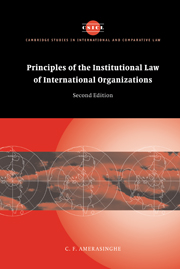Book contents
- Frontmatter
- Contents
- Preface
- List of abbreviations
- Table of cases
- 1 Introduction
- 2 Interpretation of texts
- 3 Legal personality
- 4 Membership and representation
- 5 Non-Judicial organs of organizations
- 6 Acts of non-judicial organs: their legal effect
- 7 Acts of non-judicial organs: the doctrine of ultra vires
- 8 Judicial organs
- 9 The internal law: employment relations
- 10 Privileges and immunities
- 11 Financing
- 12 Responsibility to and of international organizations
- 13 The liability of member states vis-à-vis third parties
- 14 Amendment of constitutions
- 15 Dissolution and succession
- 16 The settlement of disputes
- Index
- Cambridge Studies in International and Comparative Law
10 - Privileges and immunities
Published online by Cambridge University Press: 10 December 2009
- Frontmatter
- Contents
- Preface
- List of abbreviations
- Table of cases
- 1 Introduction
- 2 Interpretation of texts
- 3 Legal personality
- 4 Membership and representation
- 5 Non-Judicial organs of organizations
- 6 Acts of non-judicial organs: their legal effect
- 7 Acts of non-judicial organs: the doctrine of ultra vires
- 8 Judicial organs
- 9 The internal law: employment relations
- 10 Privileges and immunities
- 11 Financing
- 12 Responsibility to and of international organizations
- 13 The liability of member states vis-à-vis third parties
- 14 Amendment of constitutions
- 15 Dissolution and succession
- 16 The settlement of disputes
- Index
- Cambridge Studies in International and Comparative Law
Summary
Privileges and immunities have been accorded to states and their diplomatic personnel by other states as a result of the development of customary international law. These were largely based on a theory of equality, supported by the principle of reciprocity, and historically reflected the respect states had for each other's sovereignty. Now the law of diplomatic privileges and immunities has been largely codified in the 1961 Vienna Convention on Diplomatic Relations. Customary international law, however, had nothing originally to say on the privileges and immunities of international organizations and their personnel which are a recent phenomenon. These privileges and immunities have, consequently, been largely accorded through treaties and conventions. It has come to be recognized that for the effective exercise of the functions of international organizations it is required that states concede privileges and immunities to international organizations, their premises and their personnel, including the representatives of member states to these organizations. These privileges and immunities are not always analogous to those of states, but are comparable. The conventional law according these privileges and immunities is contained in the constitutions of organizations, bilateral agreements and multilateral conventions, such as the General Convention on the Privileges and Immunities of the UN of 1946.
International organizations enjoy privileges and immunities entirely because they are necessary for the fulfilment of their purposes and functions. Because the basis of such privileges and immunities is functional, organizations are and can expect to be accorded only those privileges and immunities which are necessary for that purpose.
- Type
- Chapter
- Information
- Publisher: Cambridge University PressPrint publication year: 2005



